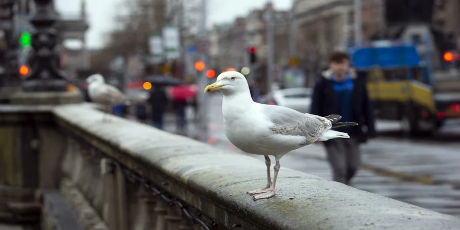Why Cork gulls aren't as vicious as Dublin ones about your sandwiches 16 Apr 2025

Analysis: Seagulls have gained a fearsome reputation for stealing food from humans in the capital and elswhere, but it's a different story in Cork - Dr. Fidelma Butler, School of Biological, Earth and Environmetal Sciences/ERI, UCC
A colleague on a recent visit from Dublin remarked at being able to eat a sandwich outdoors in Cork city without being assaulted by 'voracious gulls'. "Do you not have any seagulls in Cork?" he enquired with genuine amazement.
Well, of course we have seagulls and a fine variety too: herring gulls, lesser black-backed gulls, black-headed gulls and common gull in winter. In fact, gulls seem to be quite happy in Cork city and, as my colleague will confirm, they are very happy in Dublin also where they have gained a fearsome reputation for stealing food from unsuspecting humans. In fact, gulls are associated with this unsavoury activity in many cities across the developed world, but why not in Cork?
Gulls occur across a wide range of habitats but, over the last five decades, are increasingly associated with urban living. There are many reasons for this shift into the cities, among them are: declining natural food in the form of reducing fish stocks; reduced scavenging opportunities following the closure of open landfill sites; abundant human food in cities; and safe nesting sites high up on rooftops and window ledges. It seems as though cities are favourable real estate for gulls.
Moving into a new environment presents a range of challenges to any animal, one of which is finding food. How do you find out what is good to eat? Here gulls have a few natural skills and stealing is one of them. Gulls, like many other bird species, are ‘kleptoparasites’ which means they steal from each other and from other species. This gives them the advantage of acquiring food without having to spend a lot of energy looking for it.
Gulls are also pretty clever and they can adapt to new sources of food by developing new strategies to overcome the defences and protections of other species. For example herring gulls in Dún Laoghaire, Co. Dublin, have been reported using a novel method to feed on troublesome sea squirts by removing the tough outer tunic of this marine organism.
Gulls are social species and they observe and copy what other gulls are doing and eating – this is why you see gulls flock to a food source, be it a shoal of fish at sea or a scatter of breadcrumbs thrown on a park lawn. Watching what others are doing is an energy efficient way of surviving in a new environment.
All useful features for moving into a city and surviving in a new environment. Of course there are a lot of humans in cities and it is now well accepted that gulls recognise and are attracted by humans handling food. In fact, gulls are more attracted to food they have seen to be handled by humans than the same food if they have not observed it being handled.
So, why do we not have a sandwich-stealing gull problem in Cork city? There are some differences between Cork and the gull-problem cities. Firstly, there are fewer urban gulls in Cork (1.2 / km2) than in Dublin (10.5 /km2) or Galway (2.6 / km2).
While gulls are known to steal from others, not all individuals will have the risk-taking temperament to approach a human. Risk-taking in animals is associated with a ‘bold’ or adventurous personality. "We know that many individuals living in urban environments are bolder and take greater risks than their country counterparts" commented UCC/ERI Professor John Quinn, who works on personality and cognition in birds.
Nevertheless, only a small portion of any group will be ‘bold’ enough to steal food and thus the incidence of kleptoparasitism in gulls increases with increased population density. So, more gulls, more chance of encountering risk-taking individuals.
Add to that the stimulus to steal, the stimulus of lots of people regularly eating in the open - and here is another difference. Cork city has many wonderful outdoor public amenities but it does not have city centre spaces on the scale of Stephen's Green or Eyre Square, where people regularly congregate in large numbers and can be observed eating. So, fewer gulls to initiate the behaviour and fewer opportunities for these birds to observe humans eating may just be the factors that are holding the less admirable qualities of these birds in check.
Alas, this may only be a temporary reprieve. Gulls show remarkable behavioural flexibility and as their natural food continues to decline it may only be a matter of time before a few gulls emerge who are ‘bold’ enough to steal from the good people of Cork.